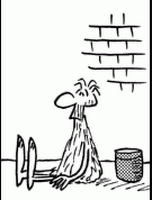 |
| Just some bread to eat. But what does it tell me about myself? |
I have been dipping into a curious book: Breakdown of Will (2001) by George Ainslie. He is described as a "behavior economist", a field I know almost nothing about. Wikipedia contains a line that nicely sums up what some of the early chapters describe:
"Given two similar rewards, humans show a preference for one that arrives sooner rather than later. Humans are said to discount the value of the later reward, by a factor that increases with the length of the delay."
Ainslie has conducted animal and human studies into the subject of reward and preference and has charted these curves of "discounting the values of future rewards", and discovered that many are hyperbolic. In any given choice, we are comparing hyperbolic trends of various rewards and making a decision, not based on reason, or passion, but based on the curves of discounting (this seems to be hardwired into all life: just as a dog can leap into the air to catch a frisbee in its mouth, without first sitting down and carefully calculating the ballistics of the motion). Some of these curves can be in diametrically different directions.
Ainslie gives a couple of very interesting examples that are more than mere analogies. It is like when several people have to work together, but they have different purposes: for example, a leader in a hierarchical organization may have needs to improve productivity, but a worker might simply have a need to improve the quality of their own work, which may be at odds with the leader's will. These competing rewards are weighted, and what work finally gets done is a sort of compromise, with the closest rewards being accomplished first. Now where this really gets interesting is that Ainslie goes further and suggests that the thing which we call a "self" is really just a mass of of these intersecting hyperbolic curves. He asks,
"How does a marketplace of hyperbolically discounted choices ever come to look like a single individual?"
This borders on the metaphysical. Here, the self seems to be depicted as the current point at which all competing hyperbolic discount curves intersect. The will appears to be a construct of these economic trends. This sort of stuff interests me.
Furthermore, these studies are important for people like me who struggle with addiction. In my case, I'm addicted to bread. But not just any bread. In this blog I began baking yeasted, no-knead breads, and now I'm baking almost exclusively wholegrain sourdough breads. If I was addicted to just any bread, it would have been far more practical for me to just buy a loaf at the store, or perhaps stop trying to make better bread than the no-knead methods gave me. For some reason, the rewards of baking my own wholegrain wild-yeastbread outweigh the mere need to eat bread, or make bread.
What is it about a wholegrain sourdough loaf that is so rewarding to me that I will wait upwards of 2 days to make it, and work on it for 8 hours or more at a stretch, and spend a lot of time and resources on baking it, when I could simply just walk to the grocery store and buy something else that for most people passes for bread?
Who the heck am I, that I am not discounting the future reward of a wholegrain sourdough bread like everyone else who buys those inferior mushy loaves from the store? What is the reward of these breads that they go against all reason, all passion, all economic theories?
Just an everyday bread.
Notes to Myself
- I have been dipping into a lot of similar books recently that poo-poo the notion that we have a conscious will (e.g. The Illusion of Conscious Will by Daniel M. Wegner). The whole question of what is soul, what is self, what is consciousness, what is will, naturally interests me because of the nature of my work with those who are terminally ill.







No comments:
Post a Comment